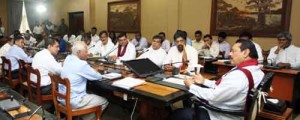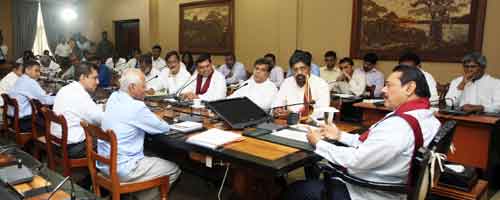 |
| President meeting editors ( file photo – FT) |
UNP flays MR, editors for discussing impeachment move
President Mahinda Rajapaksa should inform parliament how he intended to handle the impeachment issue, the UNP said, while strongly criticising the President for meeting editors of national newspapers at Temple Trees, where the discussion centered on the impeachment.
In a hard hitting two-page statement issued from party headquarters, the UNP said that newspaper editors should have left the meeting immediately after members of the now defunct Parliamentary Select Committee (PSC) which dealt with the issue came into the room. Instead they proceeded to have breakfast with the President.
The UNP was responding to media reports of a meeting between President Rajapaksa and editors of newspapers wherein the President stated that he would have an independent inquiry after conclusion of the Parliamentary process.
The following is the full text of the UNP statement:
The UNP wishes to make the fallowing observations:
Parliament is responsible for inquiring into the matters stated in the Resolution under Article 107 against Chief Justice Shirani Bandaranayake. Therefore the President should inform Parliament and not the newspaper Editors of how he proposes to act in regard to the Resolution. instead, he made this statement at a meeting of newspaper Editors. This is nothing more than a meeting called by the Commander in Chief of the Armed Forces and the Editor in Chief of the Republic President Mahinda Rajapaksa to give instructions to the Media. When the Government members of the now defunct Parliamentary Select Committee came in to the room the Media should have left the meeting. Instead, they proceeded to have breakfast with the President.
Once a resolution is passed under Article 107, the President has no option but to remove the Judge in relation to whom the resolution has been passed. He has no discretion on the matter. If he does not, he has violated the constitution and has to be impeached under Article 38 (2) of the Constitution. Neither is there legal provision for the Parliament to hold an inquiry at that stage. The proposed inquiry is against the Latimer House Principles which envisages an inquiry before Parliament passes a Resolution.
After the 2003 Abuja Commonwealth Heads of Government Conference, countries such as the United Kingdom(Constitutional Reform Act 2005) and New Zealand (judicial Conduct Commission and Judicial Conduct Panel Act 2004) brought in legislation to fall in line with the principles enunciated there.
In the United Kingdom and the United States of America where impeachment proceedings to remove judges originated, there are two Chambers. First, the House of Commons (UK) and the House of Representatives (USA) initiates them process and prepares the articles of impeachment. The Second Chamber, the House of Lords, (UK) and the US Senate then carry out the trial. Our Parliament is an uni-cameral Parliament, ie. it consists of one chamber. In 1984 there were two Select Committees on Chief Justice Neville Samarakoon. The first Select Committee went into the facts. The findings of the Select Committee were as follows;
“Your Committee is of opinion that although the statements referred to above may not bring the entire Supreme Court into disrepute, they are not befitting the holder of the Office of the Chief justice”.
The Second Select Committee went into the question whether Chief justice Neville Samarakoon’s conduct amounted to ‘misbehaviour’ under Article 107. They held:
“Every breach of convention does not necessarily amount to proved misbehaviour. The standard of proof required is very high. In all the circumstances of this case, whiled this Committed cannot but condemn this speech we cannot come to the conclusion that the lion. Chief Justice is guilty of proved misbehaviour”.
In this instance, there has only been one Select Committee which only accepted charges 1, 4, and 5 of the Resolution. The Select Committee has also admitted that they did not have the benefit of Chief justice Shirani Bandaranayake’s evidence. The Chief Justice withdrew from the Select Committee proceedings as they failed to follow proper procedure and adhere to Article 12 of the Constitution which guarantees equal treatment before the law to every citizen. In this background a Second Inquiry is necessary before a Resolution is presented to Parliament.
Standing Order 78A is silent on the procedure to be followed by the House after the Select Committee Report is tabled. The necessary legal provisions can be made if the Cabinet adopts as an urgent Bill the Private Members Bill titled “Removal of Judges of the Superior Courts” presented by Wijeyadasa Rajapaksa, MP. This can be passed in Parliament on 08 January 2013 without debate making way for the second Inquiry.
Therefore President Rajapaksa and his Government must act within the law according to the Latimer House Principles and hold the inquiry as stated above.
IS
